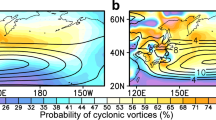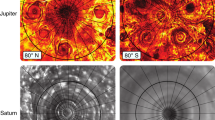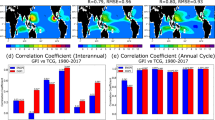Abstract
THE reply of Mr. W. H. Dines, in NATURE, April 14, p. 495, to Major Goldie's letter, brings out very convincingly the peculiar fact that the temperature conditions of the troposphere, both in cyclones and anticyclones, are such as would rather obliterate than maintain them. Indeed, when we consider the problem of pressure distribution, we find that the conditions are generally exactly the reverse of those required by the ordinary accepted theory, except in latitudes within the tropics of Capricorn and Cancer. We are thus faced with a very striking theoretical difficulty; for the winds of the earth do not appear, in the main, to derive their force and direction from the temperature conditions at or near the earth's surface.
This is a preview of subscription content, access via your institution
Access options
Subscribe to this journal
Receive 51 print issues and online access
$199.00 per year
only $3.90 per issue
Buy this article
- Purchase on Springer Link
- Instant access to full article PDF
Prices may be subject to local taxes which are calculated during checkout
Similar content being viewed by others
Author information
Authors and Affiliations
Rights and permissions
About this article
Cite this article
DEELEY, R. The Cause of Anticyclones. Nature 111, 634–635 (1923). https://doi.org/10.1038/111634b0
Issue Date:
DOI: https://doi.org/10.1038/111634b0
Comments
By submitting a comment you agree to abide by our Terms and Community Guidelines. If you find something abusive or that does not comply with our terms or guidelines please flag it as inappropriate.



